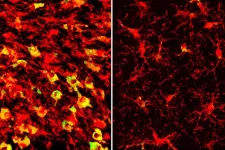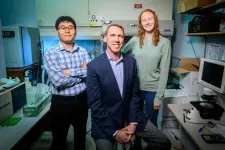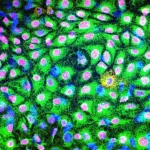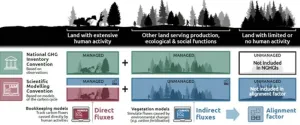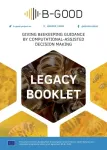(Press-News.org) In Alzheimer’s disease and related dementias, cognitive decline is driven by the overaccumulation of a normal brain protein known as tau. Wherever tau builds up, nearby brain tissue starts to degenerate and die.
Now, researchers at Washington University School of Medicine in St. Louis have found — in mice — that Alzheimer’s-like tau deposits in the brain lead to the accumulation of a form of cholesterol known as cholesteryl esters, and that lowering cholesteryl ester levels helps prevent brain damage and behavioral changes.
“This has important therapeutic implications,” said senior author David M. Holtzman, MD, the Barbara Burton and Reuben M. Morriss III Distinguished Professor of Neurology. “The compound we used in this study has side effects that make it unsuitable for use in people. But if you could develop a therapy that reduces cholesteryl esters inside brain cells without unacceptable side effects, it would be a promising candidate to test in neurodegenerative diseases.”
The findings are published Nov. 22 in the journal Neuron.
The link between cholesterol and dementia is not as far-fetched as it might seem. The biggest genetic risk factor for Alzheimer’s is APOE, a gene involved in activating the brain’s immune cells. When such cells are activated in the wrong way or at the wrong time, they can damage brain tissue. But APOE also has another important job in the body: It carries cholesterol and other lipids around in the blood. In this capacity, it plays a role in atherosclerosis.
To investigate the connections between APOE, lipids and brain damage, Holtzman and first author Alexandra Litvinchuk, PhD, a postdoctoral researcher, studied mice with a high-risk tau gene that predisposes them to accumulate tau in their brains. Such mice start developing signs of neurodegeneration around 6 months of age. By 9½ months, their brains are severely damaged, and they no longer are able to complete ordinary tasks of mouse life such as properly building a nest. The mice also carried a second genetic modification: Their own APOE genes had been removed and either replaced with a variant of the human APOE gene — APOE3, which confers an average risk of Alzheimer’s; or APOE4, which doubles or triples the risk of Alzheimer’s — or not replaced at all.
Investigation revealed that APOE4 is linked to distorted lipid metabolism in the brain. In 9½-month-old tau mice carrying APOE4, the same brain areas that became atrophied and damaged also amassed excess lipids, and in a strange pattern. Levels of more than 180 kinds of lipids were altered. Among the most striking differences was that immune cells known as microglia in those areas were filled to the brim with cholesteryl esters. APOE3 did not have the same effect. The measurement of the brain lipids was done in collaboration with scientists at the company Denali Therapeutics led by Gilbert Di Paolo, PhD.
“Microglia filled up with lipids become hyperinflammatory and start secreting things that are not good for the brain,” Holtzman said.
Therefore, clearing out lipids potentially could reduce brain inflammation and neurodegeneration, he said. To find out, Litvinchuk and Holtzman used an LXR agonist, a member of an experimental class of drugs that lowers lipid levels in cells. The researchers fed the drug, called GW3965, to tau mice carrying APOE4, starting at 6 months of age. The mice were assessed at 9½ months, by which point their brains normally would have sustained considerable damage. Mice that had received the drug retained significantly more brain volume than those that had received a placebo. They also had lower levels of tau, fewer inflammatory cells and less inflammation, less loss of synapses in their brains, and were better at building nests.
Further investigation revealed that the LXR agonist works by upregulating a gene called Abca1 that helps move cholesterol and other lipids out of cells. Using genetic methods to increase Abca1 levels had the same effect as drug treatment: less lipid accumulation, lower levels of tau, less inflammation and reduced neurodegeneration.
“What’s exciting is that we see all these effects in an animal model that shares a lot of features with human neurodegenerative diseases,” Holtzman said. “It shows that this kind of approach could have a lot of promise.”
One major obstacle stands in the way of translating this approach to people, Holtzman added. LXR agonists also affect lipid metabolism in the liver, and so they tend to cause fatty liver disease. Chemists are hard at work trying to design LXR agonists without that side effect. If they succeed, the resulting drugs may have benefits for heart disease as well as brain disease.
“There’s a lot of similarity between the mechanism that’s driving immune cells to damage the brain in Alzheimer’s disease and the one that’s driving the same kinds of immune cells to cause vascular damage in atherosclerosis,” Holtzman said. “In both cases, lipids accumulate in immune cells, causing them to become hyperinflammatory and damage nearby tissues. Getting rid of that lipid accumulation may have double benefits for human health.”
END
Lowering a form of brain cholesterol reduces Alzheimer’s-like damage in mice
Targeting cholesterol potentially could help treat Alzheimer’s, related dementias
2023-11-22
ELSE PRESS RELEASES FROM THIS DATE:
Segregated patterns of hospital care delivery and health outcomes
2023-11-22
About The Study: This study of Medicare claims data for 4,386 hospitals found that higher segregation of hospital care was associated with poorer health outcomes for both Black and white patients, with significantly greater negative health outcomes for Black populations, supporting racial segregation as a root cause of health disparities. Policymakers and clinical leaders could address this important public health issue through payment reform efforts and expansion of health insurance coverage, in addition to supporting upstream efforts to reduce racial segregation in hospital ...
Mortality and hospitalization risks in patients with cancer and the SARS-CoV-2 Omicron variant
2023-11-22
About The Study: This study showed that during the Omicron-dominant period, patients with solid cancer and COVID-19 had higher mortality and hospitalization risks following COVID-19 infection versus patients without solid cancer with COVID-19, and that COVID-19 vaccination in the patients with cancer mitigated this risk.
Authors: Salomon M. Stemmer, M.D., of Beilinson Hospital in Petah Tikva, Israel, is the corresponding author.
To access the embargoed study: Visit our For The Media website at this link https://media.jamanetwork.com/
(doi:10.1001/jamaoncol.2023.5042)
Editor’s Note: Please see the article for additional ...
ADHD medications and long-term risk of cardiovascular diseases
2023-11-22
About The Study: Longer cumulative duration of attention-deficit/hyperactivity disorder (ADHD) medication use was associated with an increased risk of cardiovascular disease, particularly hypertension and arterial disease, compared with nonuse in this study of 278,000 individuals in Sweden ages 6 to 64 who had an incident ADHD diagnosis or ADHD medication dispensation. These findings highlight the importance of carefully weighing potential benefits and risks when making treatment decisions about ...
Racial and ethnic disparity in preoperative chemosensitivity and survival in patients with early-stage breast cancer
2023-11-22
About The Study: In this study of 103,000 individuals with early-stage breast cancer, Black patients had a higher mortality risk compared with white patients among those with residual disease after neoadjuvant chemotherapy. This highlights the need for personalized treatment strategies for Black patients to help them attain pathologic complete response.
Authors: Shipra Gandhi, M.D., of Roswell Park Comprehensive Cancer Center in Buffalo, New York, is the corresponding author.
To access the embargoed ...
From the first bite, our sense of taste helps pace our eating
2023-11-22
When you eagerly dig into a long-awaited dinner, signals from your stomach to your brain keep you from eating so much you’ll regret it – or so it’s been thought. That theory had never really been directly tested until a team of scientists at UC San Francisco recently took up the question.
The picture, it turns out, is a little different.
The team, led by Zachary Knight, PhD, a UCSF professor of physiology in the Kavli Institute for Fundamental ...
Team discovers rules for breaking into Pseudomonas
2023-11-22
CHAMPAIGN, Ill. — Researchers report in the journal Nature that they have found a way to get antibacterial drugs through the nearly impenetrable outer membrane of Pseudomonas aeruginosa, a bacterium that – once it infects a person – is notoriously difficult to treat.
By bombarding P. aeruginosa with hundreds of compounds and using machine learning to determine the physical and chemical traits of those molecules that accumulated inside it, the team discovered how to penetrate the bacterium’s defenses. They used this information ...
Camouflaging stem cell-derived transplants avoids immune rejection
2023-11-22
Cell and organ transplants can be lifesaving, but patients often encounter long waiting lists due to the shortage of suitable donors. According to donatelife.net, in 2021 6,000 people died in the U.S. alone while waiting for a transplant. One day, transplants generated from stem cells may alleviate the constant organ donor shortage, making transplants available to a larger group of patients.
An issue with donation, whether it’s with solid tissues or cells from deceased or living donors, is immune rejection. Unless the donor material is carefully matched to the recipient’s immune system, the transplant will be rejected. However, stem cell research ...
Mind the gap: Caution needed when assessing land emissions in the COP28 Global Stocktake
2023-11-22
Effective management of land, whether for agriculture, forests, or settlements, plays a crucial role in addressing climate change and achieving future climate targets. Land use strategies to mitigate climate change include stopping deforestation, along with enhancing forest management efforts. Countries have recognized the importance of the land use, land-use change, and forestry (LULUCF) sector, with 118 of 143 countries including land-based emissions reductions and removals in their Nationally Determined Contributions (NDCs), which are at the heart of the Paris Agreement and the achievement of its long-term goals.
A new study, published in Nature, demonstrates that estimates of current land-based ...
Developing a new perspective for the EU beekeeping sector: B-GOOD legacy booklet
2023-11-22
The aim of the B-GOOD project (Giving Beekeeping Guidance By Computational-Assisted Decision Making) was to pave the way towards healthy and sustainable beekeeping within the European Union by following a collaborative and interdisciplinary approach. By merging data from within and around beehives, as well as wider socioeconomic conditions and by developing and testing innovative tools to perform risk assessments, B-GOOD provided guidance for beekeepers and helped them make better and more informed decisions.
The communication of scientific information and the transformation of scientific ...
How do temperature extremes influence the distribution of species?
2023-11-22
As the planet gets hotter, animal and plant species around the world will be faced with new, potentially unpredictable living conditions, which could alter ecosystems in unprecedented ways. A new study from McGill University researchers, in collaboration with researchers in Spain, Mexico, Portugal, Denmark, Australia, South Africa and other universities in Canada, investigates the importance of temperature in determining where animal species are currently found to better understand how a warming climate ...
LAST 30 PRESS RELEASES:
Scientists discover why we know when to stop scratching an itch
A hidden reason inner ear cells die – and what it means for preventing hearing loss
Researchers discover how tuberculosis bacteria use a “stealth” mechanism to evade the immune system
New microscopy technique lets scientists see cells in unprecedented detail and color
Sometimes less is more: Scientists rethink how to pack medicine into tiny delivery capsules
Scientists build low-cost microscope to study living cells in zero gravity
The Biophysical Journal names Denis V. Titov the 2025 Paper of the Year-Early Career Investigator awardee
Scientists show how your body senses cold—and why menthol feels cool
Scientists deliver new molecule for getting DNA into cells
Study reveals insights about brain regions linked to OCD, informing potential treatments
Does ocean saltiness influence El Niño?
2026 Young Investigators: ONR celebrates new talent tackling warfighter challenges
Genetics help explain who gets the ‘telltale tingle’ from music, art and literature
Many Americans misunderstand medical aid in dying laws
Researchers publish landmark infectious disease study in ‘Science’
New NSF award supports innovative role-playing game approach to strengthening research security in academia
Kumar named to ACMA Emerging Leaders Program for 2026
AI language models could transform aquatic environmental risk assessment
New isotope tools reveal hidden pathways reshaping the global nitrogen cycle
Study reveals how antibiotic structure controls removal from water using biochar
Why chronic pain lasts longer in women: Immune cells offer clues
Toxic exposure creates epigenetic disease risk over 20 generations
More time spent on social media linked to steroid use intentions among boys and men
New study suggests a “kick it while it’s down” approach to cancer treatment could improve cure rates
Milken Institute, Ann Theodore Foundation launch new grant to support clinical trial for potential sarcoidosis treatment
New strategies boost effectiveness of CAR-NK therapy against cancer
Study: Adolescent cannabis use linked to doubling risk of psychotic and bipolar disorders
Invisible harms: drug-related deaths spike after hurricanes and tropical storms
Adolescent cannabis use and risk of psychotic, bipolar, depressive, and anxiety disorders
Anxiety, depression, and care barriers in adults with intellectual and developmental disabilities
[Press-News.org] Lowering a form of brain cholesterol reduces Alzheimer’s-like damage in miceTargeting cholesterol potentially could help treat Alzheimer’s, related dementias
